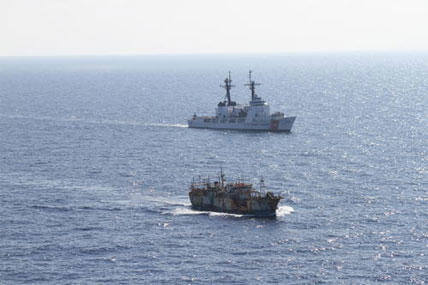A destructive fishing practice indiscriminately killing massive amounts of marine life is taking place in our world’s oceans. The practice of dragging enormous nets suspended for miles in open water is called high seas drift net fishing and is a form of illegal, unreported and unregulated fishing.
The practice is universally condemned and is a significant threat to ocean ecosystems and to the food and economic security of nations and communities relying on fisheries resources. The practice is often difficult to track and detect but the U.S. Coast Guard partnered together with Chinese law enforcement to seize a fishing vessel caught in the act.
The fishing vessel Da Cheng, a 177-foot fishing vessel, was seized 850 miles east of Tokyo, Japan, in the North Pacific Ocean for large-scale high seas drift net fishing. The Da Cheng was targeting albacore tuna using 10 miles of large-scale drift nets and had already caught about 30 metric tons of albacore tuna during its current trip. In addition, Coast Guard Cutter Rush found six metric tons of shark bodies and fins aboard the vessel.
Upon seizing the vessel, the 17th Coast Guard District transferred custody of the Da Cheng to two patrol vessels from the China Fishery Law Enforcement Command.
“Our Chinese law enforcement partners take the practice of HSDN fishing as seriously as we do. I have full faith that they will utilize the most stringent methods possible to prosecute the vessel and its owners,” said Rear Adm. Thomas Ostebo, commander of the 17th District.
Both the United States and China actively participate in international efforts to deter the practice of large-scale high seas drift net fishing as encouraged by a 1992 United Nations moratorium. The Coast Guard and NOAA Fisheries Service host enforcement officers from the China Fishery Law Enforcement Command aboard Coast Guard cutters patrolling in the North Pacific Ocean. The Coast Guard also participates in closely coordinated fisheries enforcement patrols with the member nations of the North Pacific Anadromous Fisheries Commission and North Pacific Coast Guard Forum.
The crew of Rush sighted the Da Cheng on the high seas of the North Pacific Ocean and boarded the vessel at sea in accordance with the Western and Central Pacific Fisheries Commission’s high seas boarding and inspection procedures July 27, 2012. The vessel was subsequently determined to be operating without valid flag state registration.
Rush’s boarding team reported the Da Cheng displayed the characteristics of a renegade vessel engaging in HSDN fishing. The boarding team identified three serious WCPFC violations: use of prohibited fishing gear including more than 2.5 miles of high seas drift net; failure to maintain sufficient records of catch and catch-related data; and fishing without a license, permit or authorization issued by a sanctioned authority. In addition, violations of the International Convention for the Prevention of Pollution From Ships were also documented by the Coast Guard.
“The roles our high endurance and national security cutters play at detecting, monitoring and interdicting IUU fishing vessels highlight their continued value to the American public on the high seas. We, along with our partner nations and law enforcement agencies, are working to protect vital world fish stocks while working to end this despicable and illegal fishing practice,” said Ostebo.
As the only U.S. agency with the infrastructure and authority to project law enforcement presence throughout the 3.36 million square mile U.S. Exclusive Economic Zone and in key areas of the high seas, the Coast Guard is the lead U.S. agency for at-sea enforcement of living marine resource laws. This case reflects the value of having a multi-mission maritime service adequately equipped to protect critical marine resources.
“Our continued close working relationship with enforcement partners including the Coast Guard really pays off in situations like this,” said Sam Rauch, deputy assistant administrator of NOAA’s Fisheries Service. “Annual global economic losses due to illegal, unreported and unregulated fishing are estimated to be approximately $10 billion to $23 billion. This is felt throughout the world, including by our fishermen here in the U.S.”




























